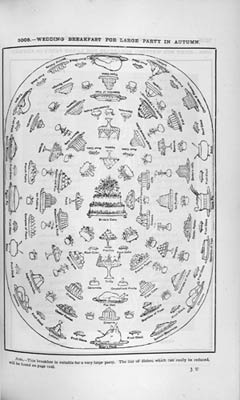|

NOTES ON ISSUE 4: HISTORICAL GLOSSARY
PART 2 OF 2
when they were united in holy matrimony they went home to breakfast…
The wedding-breakfast was an important part of Victorian weddings, akin to (but generally less elaborate than) the reception today. The law at the time required that marriage ceremonies take place before noon, meaning that the primary form of celebration afterward was a breakfast. Wedding breakfasts could range from simple repasts of cake and champagne to this elegant, elaborate spread, depicted in Mrs. Beeton's Book of Household Management. Given the practical nature of the principals and their aversion to sentimental display, wedding-breakfast for Louisa and Bounderby would probably have fallen somewhere between the two extremes.

Click
on image for larger view
in what bottoms
That is, in the holds of what ships.
fit helpmates for the calculating
boy
The "calculating boy" may refer to George
Bidder (1806-78), a mathematical prodigy who was publicly exhibited
during the nineteenth century.
a nuptial trip to Lyons
Lyons was a major center of silk manufacturing,
so the honeymoon trip to Lyons is hardly a romantic escape;
rather, it is probably more business than pleasure for Bounderby.
Dickens was appalled when he visited Lyons, and wrote of the
city in Pictures from Italy (1846):
What a city Lyons is!…The two great streets through which the two great rivers dash, and all the little streets whose name is Legion, were scorching, blistering, and sweltering. The houses, high and vast, dirty to excess, rotten as old cheeses, and as thickly peopled. All up in the hills that hem the city in, these houses swarm; and the mites inside were lolling out of the windows, and drying their ragged clothes on poles, and crawling in and out at the doors, and coming out to pant and gasp upon the pavement, and creeping in and out among huge piles and bales of fusty, musty, stifling goods; and living, or rather not dying till their time should come, in an exhausted receiver. Every manufacturing town, melted into one, would hardly convey an impression of Lyons as it presented itself to me: for all the undrained, unscavengered qualities of a foreign town seemed engrafted, there, upon the native miseries of a manufacturing one; and it bears such fruit as I would go some miles out of my way to avoid encountering again.
|

